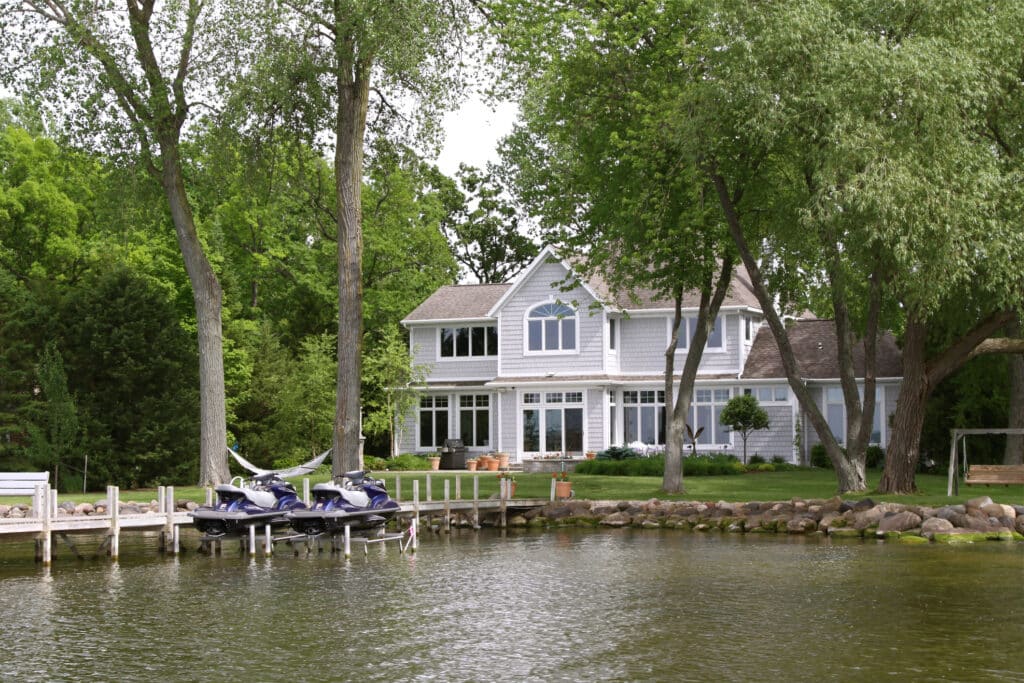Lakefront homes are beautiful, relaxing investments. However, if a lakefront home is supplied by a private water well, it’s vital to monitor that well water for contaminants that might be transmitted from the lake. A well that draws from an aquifer that is close to this standing body of water presents a special challenge.
In general, aquifers contain water that is quite clean. As water percolates through the rock and sand, it is purified before being drawn into a well for household purposes. Chemicals, fungi, or bacteria present in the lake can, however, make their way into well water.
Some lakes start out quite healthy, but when populations around lakes increase, there are more pesticides, herbicides, industrial chemicals, and fuels used around that lake. And that can be bad news for well owners. Even the land surrounding a lake is uninhabited, that water can contain giardia, bacteria, and E. coli at levels that are undesirable, resulting from animal and insect activity.
Testing Wells Near Lakes
It takes the right test to determine if it’s a nearby lake or pond that is contaminating well water. Well owners generally begin with a comprehensive water test. A key factor in a correct diagnosis is understanding and interpreting the test results. We follow up our water tests with phone conversations with many well owners who are trying to narrow down the possible causes for their water contamination.
A broad understanding of and experience with well contamination helps us direct well owners to the right solution. Because ETR Laboratories is a research lab as well as a testing lab, we can often help homeowners when other experts have failed.
While there are many lake contaminants that may be found in well water, the following examples will illustrate the kinds of problems homeowners may face.
Fungi
Many water tests do not include fungi in the list of contaminants included. If a home is near a lake or pond, testing for fungi is a must. Lakes that develop high levels of fungi can create groundwater contamination that will make its way into nearby wells. Increasing levels of fertilizers or organic (plant) matter making their way into lakes can increase its fungal growth.
Gasoline Additives
A lake large enough to be used for recreation is subject to contamination from gasoline-powered watercraft. The water may have elevated levels of gasoline additives such as MTBE, benzene, xylenes, toluene and ethylbenzene. These chemicals can make their way through soil and rock underlying the lake and eventually end up in the aquifer.
A project to determine if lake contaminants were being transmitted to wells in New Jersey found that 91% of wells around two lakes were contaminated with these gasoline additives.
Iron Bacteria
If well water has an oily film on it, this could be from the presence of iron bacteria. These bacteria found in surface waters dissolve iron or manganese deposits in water. The resulting slimy deposits can cling to the insides of plumbing.
If a well is drilled too close to a lake or pond that is not treated to eliminate iron bacteria, this slime can make its way into your drinking water.
To determine if the oily film on your water comes from petroleum contamination or iron bacteria, stir a sample of the water. If the film breaks up easily, it is slime from iron bacteria, not petroleum contamination. A test checking the quantity of iron or manganese in the water can help diagnose these problems.
Regulations on Installing Water Wells Near Lakes
Most areas will have local or state regulations in effect related to how close to a lake or pond a well may be dug. But properties change. New ponds to provide water for livestock may be created or lakes may change their shape. Heavy rains may drive lake or pond water into a property where it can contaminate the well. Wells should be regularly tested to detect any changes in water quality.
Based on the results of your water test, we can offer you advice on the repair or modification of your well that can improve the quality of water supplied to your lakefront home. If you’re having trouble determining the cause of well water contamination, consult us, we can help. Call us at (800) 344-9977.

